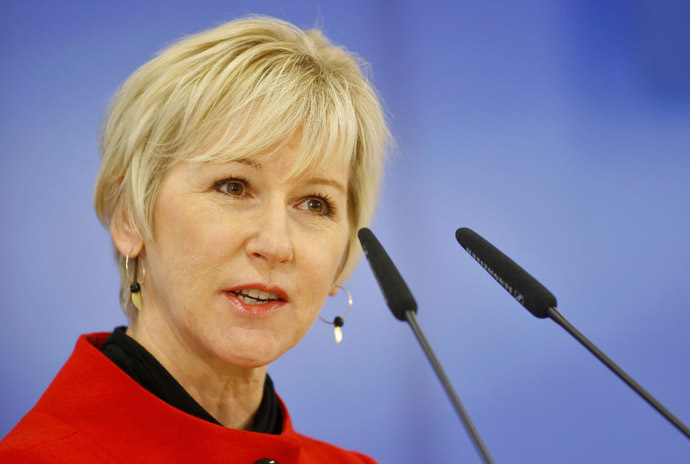'US won’t decide our policies' – Sweden on Palestinian state recognition

Washington will not be the one to decide Sweden’s policies, Swedish Foreign Minister Margot Wallström said after the US criticized Stockholm’s plans to officially recognize Palestine as a sovereign state.
“It's not the US that decides our politics,” Wallström
said, adding that the new Swedish authorities expected to
“get criticism” after their announcement on Palestinian
statehood.
However, the minister stressed that Stockholm “will continue
the constructive dialogue with the US to explain our motives and
reasons for this,” Aftonbladet newspaper reported.
In his first speech before the country's parliament on Friday,
Prime Minister Stefan Lofven promised that Sweden will
“recognize the states of Palestine.”

READ MORE:Sweden
to become first EU country to officially recognize State of
Palestine
He added that the conflict with Israel “can only be solved
with a two-state solution, negotiated in accordance with
international law.”
If the initiative is approved by parliament, Sweden will become
the first EU member to recognize Palestine as an independent
state.
But Sweden's plans were not welcomed by the US, Israel's top
ally, which warned the Scandinavians against rushing into things.
"We believe international recognition of a Palestinian state
is premature," US State Department spokesperson Jen Psaki
said. "We certainly support Palestinian statehood, but it can
only come through a negotiated outcome, a resolution of final
status issues and mutual recognitions by both parties."
She added that Israel and Palestine must be the ones "to
agree on the terms on how they live in the future two states,
living side-by-side.”
The Social Democrats gained power in Sweden during the general
election in September, following eight years of conservative
rule.
Prime Minister Lofven also promised to adjust Sweden’s foreign
policy, which would include the country giving up on its
aspirations to join NATO.
The Palestinian Authority is aiming to establish an independent
state in the territories of the Gaza Strip and the West Bank,
with East Jerusalem serving as the capital.
Israel captured both the West Bank and the Gaza Strip during the
Six Day War in 1967.
East Jerusalem was later annexed as part of Israel’s indivisible
capital, though this move has never been recognized
internationally. Israel is also actively building settlements in
the West Bank which are considered illegal by the UN.
Israel launched a 50-day military operation in the densely
populated Gaza area this summer, which saw over 2,100
Palestinians – mainly civilians – killed and some 18,000 homes
destroyed.














